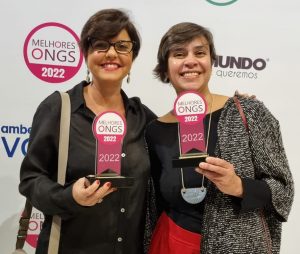By Luisa Gerbase de Lima, communicaton manager at IDIS
The “2021 Volunteering at Brazil Research” shows a positive scenario and points the way to evolution through the participation of companies! In just two decades, the number of people who have done some volunteer work at any time in their life has more than tripled, from 18% to 56% of the population.
The number of active volunteers is also remarkable – more than one-third of the population (34%). In other words, there are 57 million Brazilians who donated, in 2021, their time, talent, and energy for a cause they believe in, and who made a difference in the lives of those who benefited from the action. And why do they do it? The greatest motivation was solidarity, indicated by 74% of the volunteers.
We are thrilled with the numbers, but we cannot say they are surprising – they match the findings from other surveys that show the strengthening of the Culture of Giving and volunteering. In the World Giving Index 2021, a global study by the British Charities Aid Foundation (CAF), promoted by IDIS, Brazil was ranked 54th among 114 nations. This solidarity ranking contemplates attitudes such as donating money, helping strangers and volunteering, and in absolute terms, we moved up 14 positions compared to 2018 and 20 positions compared to the average of the previous 10 years.
Another study, the Brazil Giving Research 2020, conducted by IDIS and with an emphasis on individual donations of money to causes, shows that despite the drop in donation rates, there is a tendency for society to mature – more than 80% of interviewees agree that the act of donating makes a difference and, among nondonors, this agreement reaches 75%. The concept that donation is good for the donor also grew significantly between 2015 and 2020, from 81% to 91% of the population, reaching an almost absolute majority. Another positive aspect is that the idea that the donor should not talk about donating is losing strength. In 2015, the statement had the agreement of 84% of the population, and in 2020, the percentage dropped to 69%. This is an especially important point because talking about donations stimulates their practice, brings inspiration, clarifies fears, and arouses interest in other people.
It is in this context that volunteering is developing in Brazil, and it can be noticed that, despite the pandemic and social isolation have shaken structures, requiring quick readjustments, we were capable of meeting these challenges – 47% of the volunteers started to be more dedicated, and 21% have started to carry out online volunteer works such as psychological support and actions linked to education.
Such advances are by no means spontaneous. They are the proceeds from the work
and investment of countless organizations and individuals. Studies and research
generated data and considerations; practice enabled us to learn from successful
experiences and also from mistakes; the enhancement of the regulatory environment brought more solid bases and technology enabled us to exceed barriers and contributed to connecting people and knowledge.
The “2021 Volunteering at Brazil Research” provides a portrait of where we are, indicates points of attention, and possible paths to continue evolving. Keeping the number of volunteers growing is always desirable, but the great challenge is to turn this trend into a routine practice – we currently have 34% of Brazilian volunteers, but only about onethird of them do it on a regular basis, with a defined frequency. The answer to this transformation is in another figure – only 15% of volunteers say they participate in business programs, an indication of the huge potential that can be explored.
When we unite corporate social investment with individual desires, we find a fertile field for solidarity actions by companies with their internal stakeholders, and that is where the corporate volunteering programs come from. Possible results of this merger are many, going beyond the social impact generated and the creation of an action routine. Improvement of the organizational climate, increase of the feeling of belonging, an opportunity for the development of competencies, strengthening of ties between employees, deepening of the relationship with the company’s community, contribution to the impact strategy and private corporate social investment, attraction of talent, and contribution to the brand reputation with other stakeholders are some of the benefits of solidarity actions involving employees. Such programs are also an integral part of the ESG (Environmental, Social, and Governance) agenda, which is increasingly being considered in investor decision-making. By promoting corporate volunteer programs, everybody wins.
Generosity in the world increased, especially in economies with the most vulnerable people. This movement of caring for others and making donations, whether of time or resources, needs to continue if we are to confront the perverse effects of the pandemic and accelerate the improvement of the well-being of those who need it most. We are going in the right direction and we will move forward.
The “2021 Volunteering at Brazil survey” was promoted by Institute Datafolha and IDIS – Institute for the Development of Social Investment, and was coordinated by Silvia Maria Louzã Naccache and the consultants Kelly Alves do Carmo and Felipe Pimenta de Souza.

 “Receiving these awards makes me very emotional and fulfilled! We made many investments in people, processes and tools to strengthen our projects, and ending the year with this recognition reinforces that we are on the right path”, says Paula Fabiani, CEO of IDIS. “This is the result of the dedication of our team and council, in addition to the trust placed by our partners”, she adds.
“Receiving these awards makes me very emotional and fulfilled! We made many investments in people, processes and tools to strengthen our projects, and ending the year with this recognition reinforces that we are on the right path”, says Paula Fabiani, CEO of IDIS. “This is the result of the dedication of our team and council, in addition to the trust placed by our partners”, she adds.

